-
No-Code
Platform
-
Studio
No-code agentic platform delivering the fastest time-to-value and the highest ROI
-
Studio
-
AI-Native CRM
CRM
-
AI-Native CRM
New era CRM to manage customer & operational workflows
CRM Products -
AI-Native CRM
- Industries
- Customers
- Partners
- About
CRM Marketing - Definition, Features, and Benefits + 5 Best Marketing CRM Tools
Updated on
February 24, 2025
11 min read
Creatio CRM: Segment, Personalize, and Boost ROI

In today's digital world, effective marketing is no longer about reaching a broad audience but about engaging with customers in meaningful ways that drive loyalty and revenue.
Customer Relationship Management (CRM) software has changed how businesses approach marketing by facilitating personalized communication, streamlined processes, and data-driven decision-making. CRM marketing software is a valuable tool for businesses wanting to optimize their marketing efforts and foster lasting relationships with customers.
In this article, we explore the benefits of CRM marketing software, evaluate leading CRM solutions, and explain how to select the best software for diverse business needs. Find out how you can leverage CRM solutions to achieve marketing success and gain a competitive advantage in today's marketplace.
What is Marketing CRM?
Marketing CRM is a system that helps businesses manage relationships and cultivate deeper connections with their customers. By tracking every interaction with current customers and potential prospects, organizations can leverage data-driven insights to tailor marketing efforts to individual needs and preferences.
CRM marketing serves as a centralized repository for customer data, consolidating information from various sources such as sales interactions, website visits, social media engagements, and email interactions. This comprehensive database allows businesses to gain an overview of each client, including their preferences, purchase history, and communication preferences.
What Can Marketers do With CRM Software?
- Gain comprehensive customer insights - by collecting and analyzing client data from multiple sources, businesses can develop an understanding of their audience.
- Create personalized marketing campaigns - armed with client insights, organizations can craft highly targeted campaigns tailored to individual preferences, driving engagement and conversion rates.
- Measure and analyze performance - marketing CRM provides robust analytics tools that allow users to track the performance of their marketing efforts, measure ROI, and gain insights into customer engagement and conversion rates.
- Automate marketing processes - CRM solution offers automation capabilities, enabling marketers to streamline repetitive tasks, such as managing customer data, email campaigns, or social media posts, and deliver timely messages to clients at different stages of the buying journey.
- Streamline marketing project management - with CRM system businesses can streamline the management of their projects including adding tasks, setting deadlines, tracking progress, etc. Well-organized projects increase the team’s efficiency and boost results.
- Enhance client engagement - through personalized communication and targeted messaging, the CRM application fosters meaningful interactions with clients, driving engagement and encouraging repeat purchases.
- Improve customer retention and loyalty - by delivering personalized experiences and nurturing ongoing relationships, CRM helps businesses strengthen customer loyalty, and maximize customer retention rates.
What is CRM Marketing Automation?
CRM marketing automation is a strategic approach that leverages technology to streamline and optimize marketing tasks, allowing businesses to deliver personalized experiences at scale.
Marketing CRM automation aims to automate repetitive marketing tasks and workflows, such as email campaigns, lead nurturing, and customer segmentation, while still maintaining a high level of customization and personalization.
CRM marketing automation typically involves the following key aspects:
- Data collection and analysis - CRM systems gather and analyze customer data like interactions, transactions, and demographics from various sources. This data provides valuable insights into customer behaviors, preferences, and interests, which are crucial for crafting personalized campaigns.
- Segmentation and targeting - based on the insights derived from customer data analysis, marketing teams can segment their audience into distinct groups with similar characteristics or behaviors. This segmentation allows for more targeted and relevant messaging, increasing the effectiveness of marketing efforts.
- Automated campaign execution - once the audience is segmented, CRM solutions facilitate the creation and execution of automated marketing campaigns. These campaigns can include personalized emails with the most relevant information, offers, etc., social media posts, and targeted advertisements, delivered at the right time and through the right channels to maximize engagement.
- Monitoring and optimization - throughout the campaign lifecycle, CRM tools provide real-time analytics and reporting capabilities, allowing marketers to monitor campaign performance and track key metrics such as open rates, click-through rates, and conversion rates. This data enables continuous optimization and refinement of marketing strategies to drive better results.
CRM marketing automation streamlines marketing processes, enhances efficiency, and enables personalized engagement with clients, improving customer satisfaction, and fostering long-term customer relationships.
How Can Customer Relationship Management Software Boost Your Marketing?
The CRM system has become an indispensable tool for modern businesses looking to elevate their marketing efforts. With its ability to centralize customer data, streamline business processes, and facilitate personalized interactions, CRM offers many benefits that can significantly enhance marketing effectiveness.
Let's explore a few examples of how CRM can boost your marketing initiatives:
Understand your customers better
One of the primary advantages of CRM tools is their capability to provide a comprehensive view of each client. By collecting CRM data from various touchpoints like website visits, social media engagements, etc., the CRM system creates a unified profile for every customer.
This overview enables marketers to gain deep insights into client's behaviors, preferences, and purchasing patterns, allowing businesses to understand their client better and create more targeted campaigns.
Additionally, CRM helps marketing teams segment their audience based on various criteria such as demographics, behaviors, purchase history, and engagement level. By dividing existing customers into distinct groups, marketing professionals can tailor their messaging and offers to better resonate with each segment's specific needs and interests.
Personalize communication
Personalization has become a cornerstone of effective marketing strategies, and CRM systems help businesses personalize their communication at scale.
With CRM, marketers can leverage customer data to craft highly personalized messages and experiences across various channels, throughout the customer lifecycle.
Manage and nurture your leads
CRM streamlines the process of lead nurturing and management, helping businesses effectively capture, track, and nurture leads throughout the sales funnel.
By automating lead capture forms, tracking prospect interactions, and scoring leads based on their level of engagement, CRM ensures that marketing and sales teams can prioritize their efforts on the most promising opportunities.
Additionally, CRMs facilitate automated lead nurturing workflows, delivering relevant content and personalized communications to prospects at each stage of the customer journey to guide them toward conversion.
Manage and optimize your marketing campaigns
CRM systems provide robust tools for managing and optimizing campaigns, from planning and execution to analysis and optimization. Marketers can use CRM systems to create, schedule, and track multi-channel campaigns, ensuring consistent messaging and coordination across different touchpoints.
Engage your customer
CRM plays a vital role in driving client engagement by enabling businesses to deliver exceptional experiences. With CRM, businesses can track customer interactions in real-time, respond promptly to inquiries or complaints, and proactively engage clients with personalized offers or recommendations.
By nurturing relationships and fostering loyalty, CRM solution helps businesses retain high-value customers, increase customer lifetime value and drive growth.
Integrate with other tools
CRM tools often integrate with a variety of other marketing tools and platforms, including social media management tools, advertising platforms, and analytics solutions.
This integration enables marketing professionals to centralize their CRM data and workflows, streamline processes, and create cohesive marketing strategies across different channels.
Automate repetitive tasks to free valuable time
CRM automates marketing tasks, freeing up valuable time for marketers to focus on more strategic activities. Tasks such as data entry, lead scoring, email follow-ups, and campaign scheduling can be automated using CRM workflows and rules.
By automating these mundane tasks, marketing teams can improve productivity, reduce manual errors, and allocate their time and resources more efficiently. They can focus on activities that drive real value, such as crafting compelling content, analyzing campaign performance, and engaging with customers.
Measure the impact of marketing campaigns
CRM solutions provide analytics and reporting capabilities that allow marketing teams to measure the impact of their marketing efforts.
Marketing professionals can track key metrics such as conversion rates, customer acquisition costs, return on investment (ROI), and customer lifetime value (CLV) to measure the effectiveness of their campaigns.
5 Best Marketing CRM Software in 2025
Choosing the right CRM solution is crucial for optimizing your marketing efforts and driving business growth. In this section, we'll explore five of the best marketing CRM software options available in 2025, highlighting their key features, pros, cons, and pricing.
1. Creatio
Creatio Marketing is a comprehensive CRM platform that offers robust marketing automation features to streamline your marketing processes and drive customer engagement.
With its intuitive interface and powerful tools, Creatio enables businesses to create personalized marketing campaigns, nurture leads, and track campaign performance.
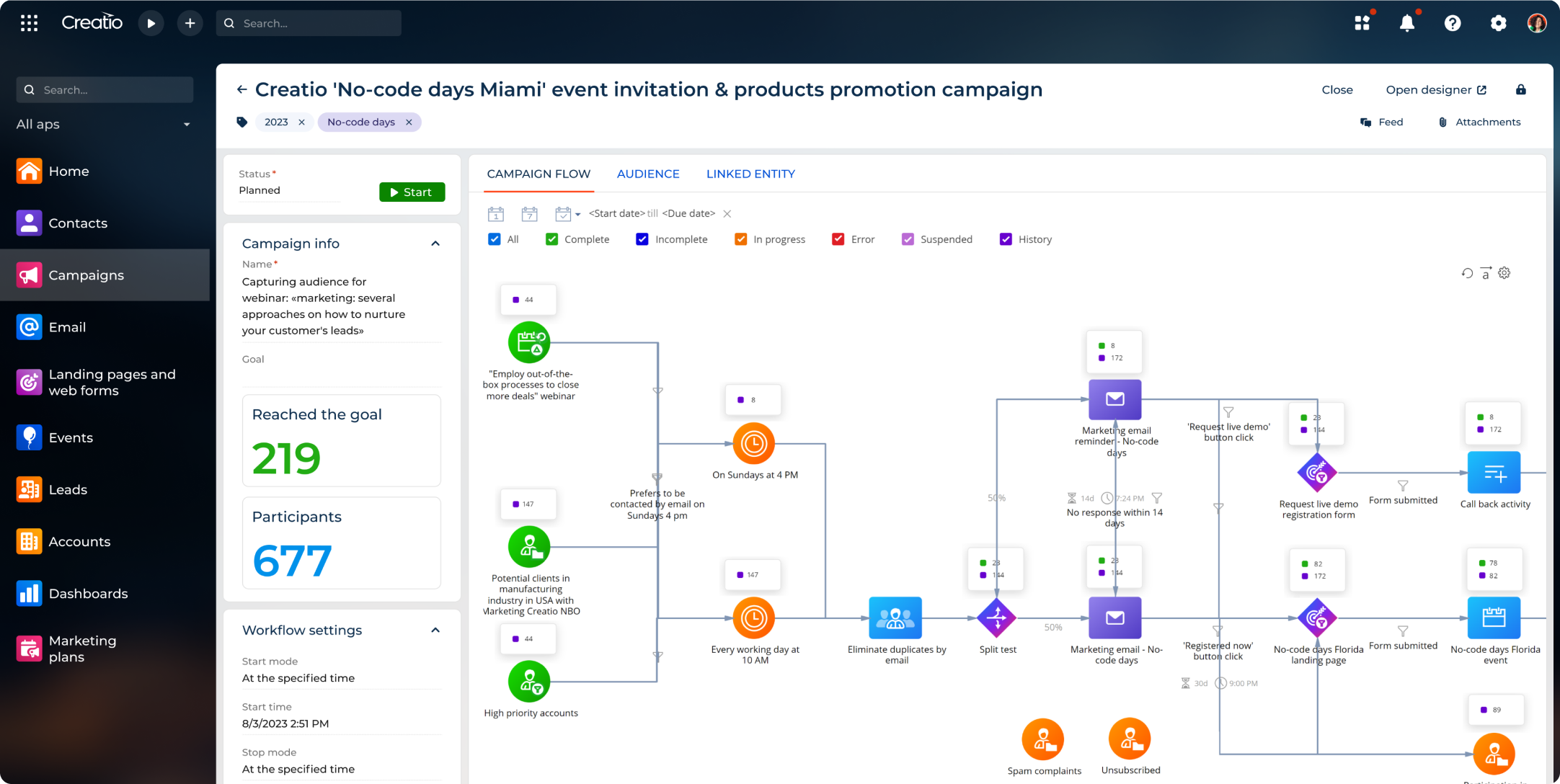
Features
- 360-degree view of contact and account data
- lead management
- campaign management
- email marketing automation
- digital ad management and analytics
- event management
- lead scoring and segmentation
- website behavior tracking
- workflow and project management
- performance and productivity management
- omnichannel communication
- analytics and reporting
Pros
- all-in-one CRM platform with integrated marketing, sales, and service functionalities.
- user-friendly interface with customizable dashboards and workflows.
- advanced marketing automation capabilities, including lead scoring, campaign management, and more.
- no-code capabilities and composable architecture that enables extensive customization even by non-technical users.
- advanced AI capabilities with NBA/NBO recommendations.
- robust analytics and reporting tools for tracking campaign performance and ROI.
- extensive marketplace with over 700 third-party applications, add-ons, and connectors.
- highly scalable solution suitable for growing businesses.
Cons
- some users may find the platform overwhelming at first, due to the multiple features and extensive customization options
Pricing
Creatio offers composable pricing that allows users to choose functionalities they really need without overpaying for redundant features. Pricing for Creatio Marketing starts at $49 per user per month and can be adapted to individual business needs.
2. Salesforce
Salesforce is a CRM platform that offers a range of marketing automation solutions to help businesses improve marketing efforts and drive revenue growth.
Salesforce enables marketers to create personalized customer experience, automate tedious tasks, and measure the impact of their marketing efforts.
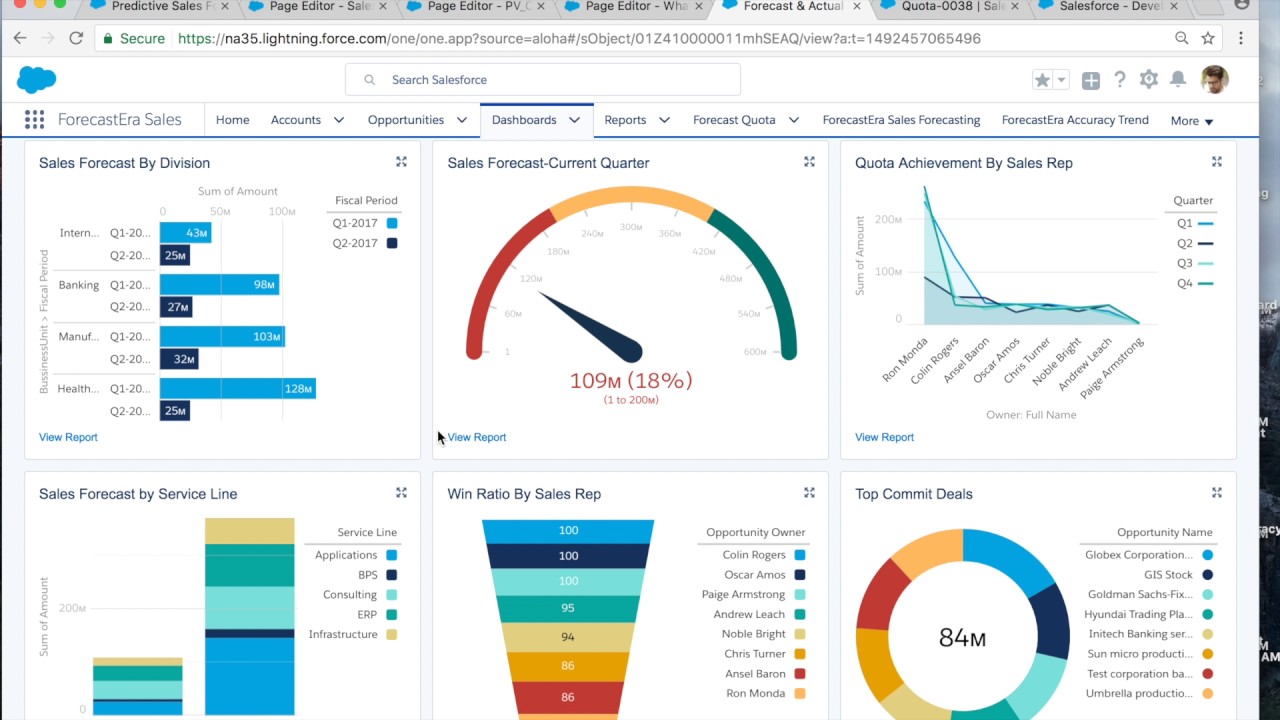
Features
- client data platform
- marketing AI
- lead scoring
- referral marketing
- campaign management
- loyalty management
Pros
- powerful AI capabilities for lead scoring and grading, account-based engagement, and AI-driven insights into marketing efforts impact, etc.
- multi-channel targeting for mobile app notifications, SMS apps, webinars, etc.
- out-of-the-box reporting capabilities for tracking key areas like pipelines with campaign-influenced revenue
- scalable solution suitable for businesses of all sizes.
Cons
- pricing is complex and varies based on the selected features and add-ons.
- integration with third-party CRM and SFA platforms is limited.
- the platform is not suitable for non-technical users - it requires some level of technical expertise for setup and customization
Pricing
Salesforce pricing may pose a barrier for some businesses, ranging from $1,250 per month to even as much as $108,000 per month.
See also: Salesforce Marketing Cloud Alternatives
3. Pipedrive
Pipedrive is a user-friendly tool that combines CRM and email marketing software - Campaigns to help businesses manage email campaigns that deliver unbeatable results.
With Pipedrive, businesses can easily create personalized emails, and reach the right customers with the right message.
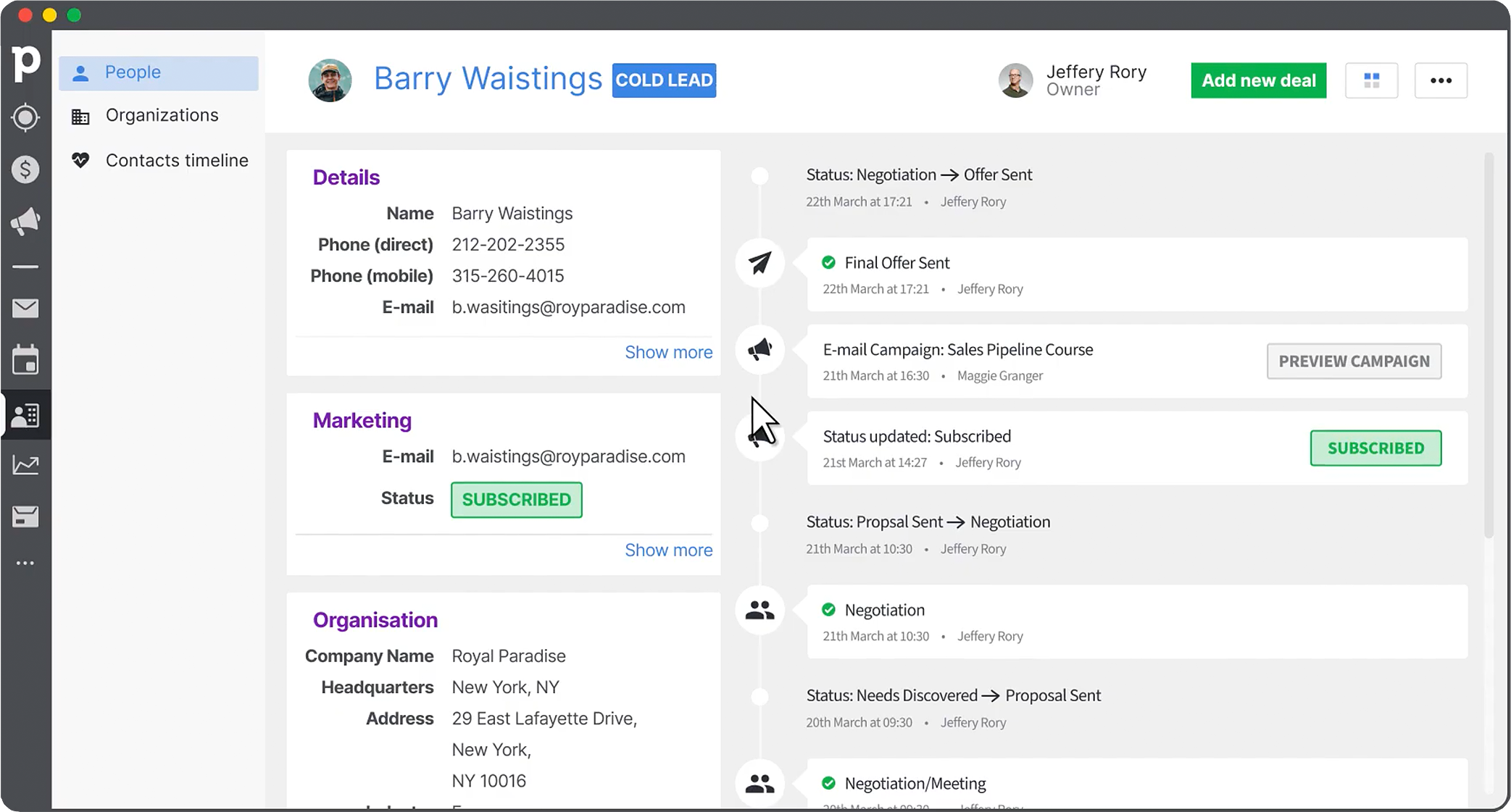
Features
- email marketing automation
- email builder
- audience segmentation
- analytics and reporting
- campaign management
- marketing workflow automation
Pros
- easy-to-use email marketing tools for sending personalized campaigns and tracking responses.
- out-of-the-box free email templates and intuitive drag-and-drop email editor.
- seamless integration with popular marketing and productivity tools.
Cons
- limited advanced marketing automation features compared to other platforms.
- reporting capabilities may be less robust for complex analytics needs.
Pricing
Pipedrive offers various pricing plans starting from $14 per user per month for the Essential plan and ranging up to $99 per user per month for the Enterprise plan.
4. ClickUp
ClickUp is a versatile project management platform that also offers CRM and marketing automation features. It helps businesses streamline their marketing processes and improve collaboration within the organization.
ClickUp's customizable workflows, task automation, and integrated communication tools enable marketing teams to plan, execute, and track their campaigns more efficiently.
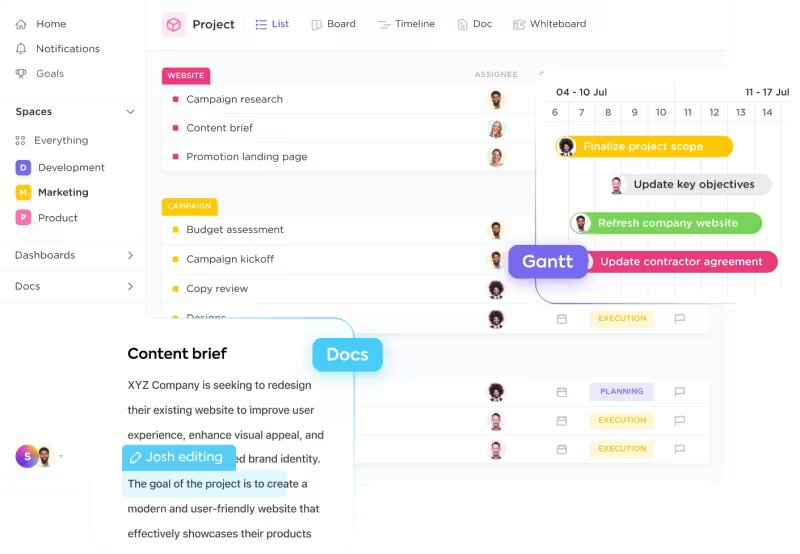
Features
- task management and automation
- customizable task lists, boards, and calendars
- collaboration tools
- content marketing management
- event marketing management
- campaign planning and tracking
Pros
- all-in-one productivity platform with project management, CRM, and marketing automation functionalities.
- robust automation features with over 100 pre-made automation workflows to streamline sales and marketing processes.
- integration with more than 1000 third-party applications
Cons
- marketing automation features may be less advanced compared to dedicated CRM platforms.
- user interface and navigation may require some adaptation for new users.
- non-technical users may need help with configuring complex workflows.
Pricing
ClickUp offers various pricing plans starting from free for basic features and $7/user/month for the Unlimited plan.
5. HubSpot
HubSpot is a marketing platform that offers a comprehensive suite of CRM and marketing automation tools to help businesses attract and engage customers.
HubSpot’s Marketing Hub offers a user-friendly interface, automation features, and extensive integrations, empowering marketing teams to create personalized experiences and drive revenue growth.
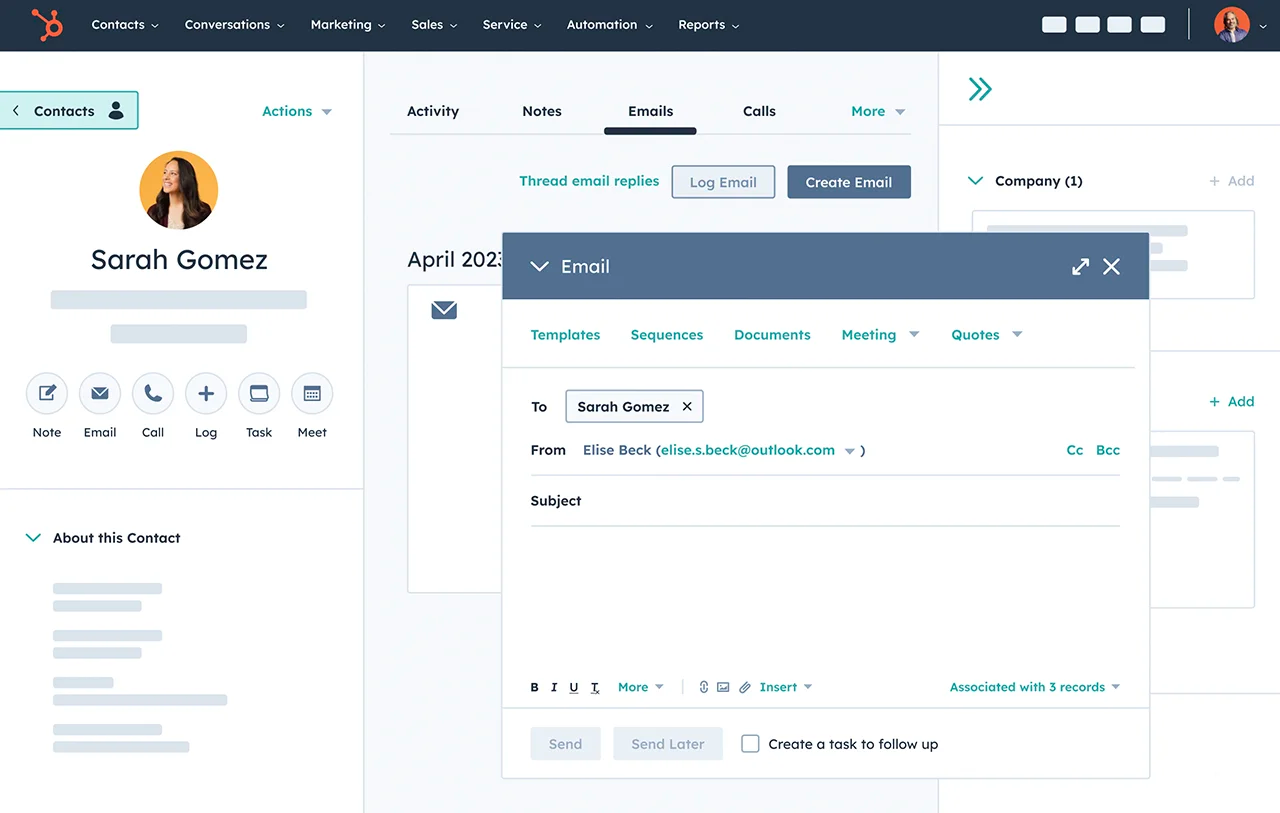
Features
- lead generation
- multi-touch revenue attribution
- email marketing automation
- ads software
- campaign management
- marketing analytics and reporting
Pros
- seamless integration with HubSpot's suite of sales, customer service, and marketing tools for end-to-end customer management.
- robust marketing automation features, including lead nurturing, and workflow automation.
- extensive library of resources, training, and support for users.
Cons
- pricing may be on the higher end for small businesses, especially for advanced features.
- some users may find the platform's complexity overwhelming.
- limited template customization makes adjusting to brand identity challenging.
Pricing
HubSpot offers various pricing plans starting from $20/ month for the Starter plan and ranging up to $3,600/month for the Enterprise plan. For small businesses, HubSpot provides a free plan with basic functionalities.
See also: Top 10 HubSpot Alternatives & Competitors
Choosing the right CRM solution is crucial for optimizing your marketing efforts and driving business growth. Whether you're looking for advanced automation capabilities, seamless integration with other tools, or user-friendly interfaces, the five CRMs highlighted above offer a range of features and functionalities to meet your marketing needs.
How to Choose the Right Marketing CRM Software?
When selecting the optimal CRM solution for your marketing teams, consider the following aspects:
Business goals
Align the features and capabilities of the CRM software with your business goals and marketing objectives. Evaluate how well the platform supports your strategies for lead generation, customer engagement, and revenue growth.
Scope of features
Assess the range of features offered by the CRM solution, including lead management, email marketing automation, campaign management, and analytics capabilities. Ensure that the platform provides the functionalities necessary to effectively execute your marketing campaigns.
Ease of use
Evaluate the user-friendliness and intuitiveness of the CRM interface. A platform that is easy to navigate and use will facilitate quicker adoption by your marketing team and ensure efficiency.
Scalability
Consider the scalability of the CRM platform to accommodate the growth of your business and evolving marketing needs. Ensure that the platform can scale seamlessly to support an increasing volume of leads, contacts, and projects as your business expands.
Integration capabilities
Assess the CRM solution's integration capabilities with other tools and platforms within your marketing tech stack. Look for seamless integrations with popular marketing automation tools, email marketing platforms, and analytics solutions to streamline workflows and enhance productivity.
Pricing
Evaluate the pricing model and affordability of the CRM software. Consider whether the pricing structure aligns with your budget and whether the platform offers flexible pricing options.
By carefully considering these aspects, you can choose the right CRM solution that aligns with your business goals and provides all the necessary features and functionalities your business needs.
Elevate Your Marketing Efforts with CRM System
Selecting the right CRM system is crucial for businesses aiming to improve their marketing strategy and achieve sustained growth. It enables organizations to streamline operations, enhance customer relationships, and drive revenue through targeted marketing efforts.
Among the available solutions, Creatio emerges as the best choice, offering a comprehensive suite of features tailored to meet the diverse needs of modern marketers. With its intuitive interface, robust marketing automation capabilities, and seamless integration with other tools, Creatio empowers businesses to streamline their marketing processes, improve client experience, and achieve tangible results.
By choosing Creatio as your company's CRM, you not only invest in advanced technology but also in a comprehensive tool that supports your business goals and drives sustainable results.
Maximize your lead-to-revenue with Creatio Marketing CRM























































